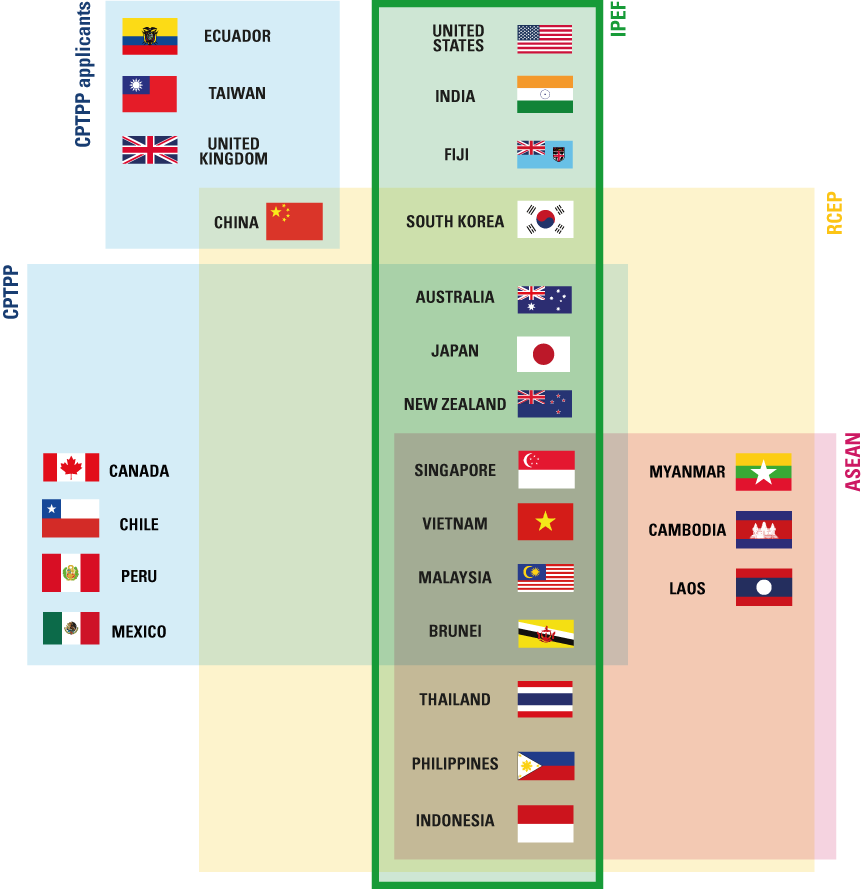IPEF Elects India as Vice-Chair of Supply Chain Council | 01 Aug 2024
Why in News?
Recently, India has been elected as Vice-Chair of the Supply Chain Council which is one of the three bodies set up by the 14-member Indo-Pacific Economic Framework (IPEF) bloc.
What is the Supply Chain Council?
- About:
- India and 13 other Indo-Pacific Economic Framework (IPEF) partners have established three supply chain bodies under the landmark Indo-Pacific Economic Framework for Prosperity (IPEF) Agreement relating to Supply Chain Resilience.
- Supply Chain Council: To pursue targeted, action-oriented work to strengthen the supply chains for those sectors and goods most critical to national security, public health, and economic well-being.
- Crisis Response Network: To provide a forum for a collective emergency response to exigent or imminent disruptions.
- Labour Rights Advisory Board: Brings together workers, employers, and governments at the same table to strengthen labour rights and workforce development across regional supply chains.
- India and 13 other Indo-Pacific Economic Framework (IPEF) partners have established three supply chain bodies under the landmark Indo-Pacific Economic Framework for Prosperity (IPEF) Agreement relating to Supply Chain Resilience.
- Recent Appointments:
-
During the meetings, each of the three supply chain bodies elected a Chair and Vice Chair, who will serve for a term of two years. The elected chairs and vice chairs are:
-
Supply Chain Council: USA (Chair) and India (Vice Chair)
-
Crisis Response Network: Republic of Korea (Chair) and Japan (Vice Chair)
-
Labour Rights Advisory Board: USA (Chair) and Fiji (Vice Chair)
-
-
-
Significance:
- The inaugural virtual meetings of the Supply Chain Council (SCC), Crisis Response Network (CRN), and Labor Rights Advisory Board (LRAB) marked a major step forward for cooperation among partner countries for strengthening supply chain resilience in the region.
- The Supply Chain Council adopted Terms of Reference and discussed initial work priorities, to be further explored at its first in-person meeting to be held in Washington in September 2024 on the margins of the Supply Chain Summit.
- The Crisis Response Network discussed near and longer-term priorities, including conducting a tabletop exercise, and planned its first in-person meeting to be held alongside the Supply Chain Summit.
- The Labor Rights Advisory Board discussed priorities for strengthening labour rights across IPEF supply chains. The convening not only will advance the work of the Labor Rights Advisory Board but also focus on the labour provisions in the IPEF Clean Economy Agreement and Fair Economy Agreement.
What is IPEF?
- About:
- IPEF was launched in May 2022 at Tokyo, Japan, comprising 14 countries. The IPEF seeks to strengthen economic engagement and cooperation among partner countries with the goal of advancing growth, economic stability and prosperity in the region.
- The IPEF is built on 4 main pillars:
- Fair and Resilient Trade: Aims to promote economic growth, peace, and prosperity in the region.
- Supply Chain Resilience: Seeks to make supply chains more resilient, robust, and well-integrated.
-
Clean Economy (renewable energy and reduction of carbon emissions): Aims to advance cooperation on clean energy and climate-friendly technologies.
-
Fair Economy (tax and anti-corruption policies): Focuses on implementing effective anti-corruption and tax measures.
- India has joined Pillars II to IV of IPEF while it has an observer status in Pillar I.
UPSC Civil Services Examination, Previous Year Question (PYQ)
Prelims:
Q. Consider the following statements:
- Vietnam has been one of the fastest-growing economies in the world in the recent years.
- Vietnam is led by a multi-party political system.
- Vietnam’s economic growth is linked to its integration with global supply chains and focus on exports.
- For a long time Vietnam’s low labour costs and stable exchange rates have attracted global manufacturers.
- Vietnam has the most productive e-service sector in the Indo-Pacific region.
Which of the statements given above are correct?
(a) 2 and 4
(b) 3 and 5
(c) 1, 3 and 4
(d) 1 and 2
Ans: (c)
Q. With what purpose is the Government of India promoting the concept of “Mega Food Parks”? (2011)
- To provide good infrastructure facilities for the food processing industry.
- To increase the processing of perishable items and reduce wastage.
- To provide emerging and eco-friendly food processing technologies to entrepreneurs.
Select the correct answer using the codes given below:
(a) 1 only
(b) 1 and 2 only
(c) 2 and 3 only
(d) 1, 2 and 3
Ans: (b)

